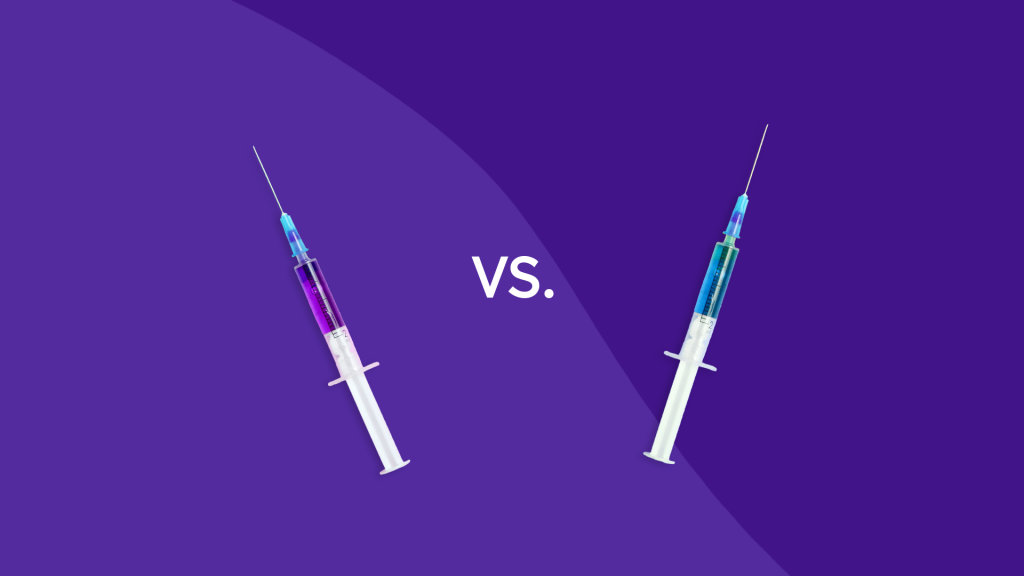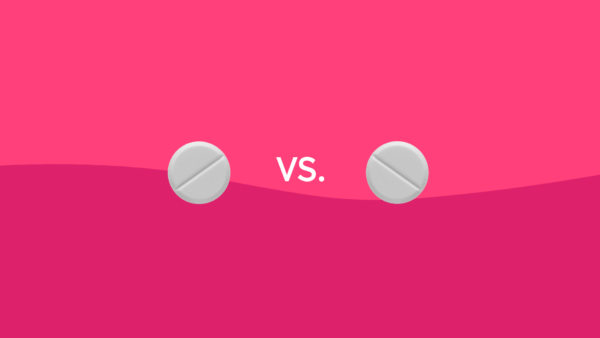Drug overview & main differences | Conditions treated | Efficacy | Insurance coverage and cost comparison | Side effects | Drug interactions | Warnings | FAQ
Remicade and Humira are two brand-name medications used for inflammatory bowel disease (IBD, which includes Crohn’s disease and ulcerative colitis) rheumatoid arthritis, and various other autoimmune diseases. You may have heard of these drugs in the news. Humira is made by AbbVie, and has been the world’s top-selling drug since 2012. Remicade is made by Janssen Biotech, Inc.
Both Remicade and Humira are prescription drugs approved by the U.S. Food and Drug Administration (FDA). They are known as biologics and are monoclonal antibodies. Remicade and Humira are in a drug class called tumor necrosis factor blockers, or TNF blockers. They work by blocking the activity of tumor necrosis factor, or TNF. TNF is a substance in the body that can cause inflammation and lead to various diseases related to the immune system. TNF blockers, also called TNF inhibitors, suppress the immune system, blocking the activity of TNF.
Although both Remicade and Humira are both TNF blockers, they do have some differences. Continue reading below to learn about Remicade and Humira.
What are the main differences between Remicade vs. Humira
Remicade and Humira are both TNF blockers, also known as TNF-alpha blockers. Remicade contains the ingredient infliximab. Remicade is given as an IV infusion (into a vein) by a healthcare professional.
Humira contains the ingredient adalimumab. It is available as a pen injection or a prefilled syringe injection and is given subcutaneously (under the skin of the thigh or stomach). After proper training, Humira can be self-injected by the patient, or administered by a caregiver.
| Main differences between Remicade and Humira | ||
|---|---|---|
| Remicade | Humira | |
| Drug class | Tumor necrosis factor-alpha (TNF-alpha) blocker | Tumor necrosis factor-alpha (TNF-alpha) blocker |
| Brand/generic status | Brand | Brand |
| What is the generic name? | Infliximab | Adalimumab |
| What form(s) does the drug come in? | Intravenous infusion by a healthcare professional | Subcutaneous injection (pen or prefilled syringe) by patient or caregiver |
| What is the standard dosage? | Varies | Varies |
| How long is the typical treatment? | Varies | Varies |
| Who typically uses the medication? | Adults and children (age of child depends on indication; not every indication is approved for children) | Adults and children (age of child depends on indication; not every indication is approved for children) |
Conditions treated by Remicade and Humira
Remicade is approved for the treatment of:
- Moderate to severe Crohn’s disease in adults and children 6 years and older who have not adequately responded to conventional therapy
- Moderate to severe ulcerative colitis in adults and children 6 years and older who have not adequately responded to conventional therapy
- Rheumatoid arthritis (in adults with moderately to severely active disease; in combination with methotrexate)
- Ankylosing spondylitis in adults
- Psoriatic arthritis in adults
- Plaque psoriasis in adults with chronic, severe disease which is extensive and/or disabling
Humira is approved for the treatment of:
- Moderate to severe Crohn’s disease in adults and children 6 years and older who have not adequately responded to conventional therapy
- Moderate to severe ulcerative colitis in adults and children 5 years and older who have not adequately responded to conventional therapy
- Rheumatoid arthritis (in adults with moderately to severely active disease; in combination with methotrexate or other non-biologic disease-modifying anti-rheumatic drugs, or DMARDs)
- Psoriatic arthritis in adults (alone or in combination with non-biologic DMARDs)
- Ankylosing spondylitis in adults
- Moderate to severe chronic plaque psoriasis in adults
- Juvenile idiopathic arthritis (JIA) in adults and children ages 2 years and older with moderate to severely active JIA (alone or in combination with methotrexate)
- Hidradenitis suppurativa in moderate to severe cases in adults and children ages 12 years and older
- Uveitis in adults and children ages 2 years and older
Remicade or Humira is generally taken in combination with other medications for the condition being treated. For example, a patient with rheumatoid arthritis may also be taking methotrexate, folic acid, corticosteroids, and/or nonsteroidal anti-inflammatory drugs (NSAIDs). A patient with Crohn’s disease may also be taking antibiotics, antivirals, corticosteroids, aminosalicylates, and azathioprine or mercaptopurine.
| Condition | Remicade | Humira |
| Crohn’s disease | Yes (adults and children 6 years and older) | Yes (adults and children 6 years and older) |
| Ulcerative colitis | Yes (adults and children 6 years and older) | Yes (adults and children 5 years and older) |
| Rheumatoid arthritis | Yes (adults; in combination with methotrexate) | Yes (adults; alone or in combination with methotrexate or other non-biologic DMARDs) |
| Ankylosing spondylitis | Yes (adults) | Yes (adults) |
| Psoriatic arthritis | Yes (adults) | Yes (adults; alone or in combination with non-biologic DMARDs) |
| Plaque psoriasis | Yes (adults) | Yes (adults) |
| Juvenile idiopathic arthritis | Off-label | Yes (adults and children 2 years and older; alone or in combination with methotrexate) |
| Hidradenitis suppurativa | Off-label | Yes (adults and children 12 years and older) |
| Uveitis | Off-label | Yes (adults and children 2 years and older) |
Is Remicade or Humira more effective?
A review of clinical studies looked at Remicade and Humira in patients with Crohn’s disease and found them to be similar in terms of efficacy.
The most effective medication can only be determined by your healthcare provider who can consider your medical condition(s), history, and medications you are already taking that could interact with Remicade or Humira. Your provider will also consider insurance coverage as well as the route of administration (IV infusion by a healthcare provider for Remicade, vs self-injection for Humira).
Coverage and cost comparison of Remicade vs. Humira
Remicade is often billed through medical insurance or Medicare Part B as a medical cost through the location where you get the infusion, such as a doctor’s office, infusion center, or hospital. In some cases, Remicade may be filled at a specialty pharmacy.
Humira is often filled through a specialty pharmacy, and in some cases, it can be filled at your local pharmacy. If you fill Humira at your local pharmacy, the cost could be $6,800 or more. Using a free SingleCare card can bring the price down to about $5,600 for a box of 2 prefilled syringes.
| Remicade | Humira | |
| Typically covered by insurance? | Varies | Varies |
| Typically covered by Medicare Part D? | No, but may be covered under Medicare Part B | Varies |
| Quantity | Varies | 1 box |
| Typical Medicare copay | N/A | $664-$2,960 |
| SingleCare cost | N/A | $5,600+ |
Common side effects of Remicade vs. Humira
According to the prescribing information, the most common side effects of Remicade are infections (upper respiratory, sinus, and throat infections), infusion-related reactions, headache, and stomach pain.
The most common side effects of Humira are upper respiratory infections, sinus infections, injection site reactions, headaches, and rash.
This is not a full list of side effects and other side effects may occur. Consult your healthcare provider for a full list of side effects, and read the warning section below for more information on serious reactions of Remicade and Humira.
| Remicade | Humira | |||
| Side Effect | Applicable? | Frequency | Applicable? | Frequency |
| Upper respiratory tract infection | Yes | 32% | Yes | 17% |
| Nausea | Yes | 21% | Yes | 9% |
| Headache | Yes | 18% | Yes | 12% |
| Sinus infection | Yes | 14% | Yes | 11% |
| Stomach pain | Yes | 12% | Yes | 7% |
| Sore throat/throat infection | Yes | 12% | Yes | % not specified |
| Cough | Yes | 12% | No |
|
| Bronchitis | Yes | 10% | Yes | % not specified |
| Rash | Yes | 10% | Yes | 12% |
| Indigestion | Yes | 10% | No |
|
| Fatigue | Yes | 9% | No |
|
| Reactions related to administration of drug | Yes (infusion reaction) | 20% | Yes (injection site reaction) | 8% |
Source: Remicade (DailyMed), Humira (DailyMed)
Drug interactions of Remicade vs. Humira
Remicade or Humira should not be combined with other biological products used to treat the same conditions, due to an increase in serious infections and other complications. Examples of interacting drugs include anakinra, abatacept, or tocilizumab.
Remicade or Humira also can interact with drugs that have a narrow therapeutic index. This means a drug has a small window between being safe and effective, and being toxic. These drugs include Coumadin (warfarin), cyclosporine, and theophylline.
People taking Remicade or Humira should not receive live vaccines.
This is not a full list of drug interactions and other drug interactions may occur. Before taking Remicade or Humira, tell your healthcare provider about all of the medications you take, including Rx and OTC drugs, vitamins, and supplements.
| Drug | Drug Class | Does Remicade interact? | Does Humira interact? |
| Actemra (tocilizumab) Kineret (anakinra) Orencia (abatacept) Rituxan (rituximab) |
Biologics | Yes | Yes |
| Coumadin (warfarin) | Blood thinner | Yes | Yes |
| Cyclosporine | Immunosuppressant | Yes | Yes |
| Theophylline | Xanthine | Yes | Yes |
| Live viral vaccines (such as the live MMR vaccine, live influenza nasal vaccine, live varicella vaccine) or live attenuated bacteria (such as BCG live intravesical) | Live viral vaccines or live-attenuated bacteria | Yes | Yes |
Warnings of Remicade and Humira
Remicade and Humira have a black box warning, which is the strongest warning required by the FDA. The warning states:
- Because they suppress the immune system, Remicade or Humira can increase the risk of serious infections. These infections include tuberculosis (TB), bacterial sepsis, and invasive fungal infections, and can lead to hospitalization or death.
- If a patient develops a serious infection, Remicade or Humira should be stopped.
- Before starting Remicade or Humira, a test for TB should be performed. If the test is positive, TB treatment should begin before starting Remicade or Humira. During treatment with Remicade or Humira, patients should be monitored for TB and other infections.
- Lymphoma and various other malignancies, some of which have been fatal, have occurred in children and adolescent patients treated with TNF blockers such as Remicade or Humira. Some cases of a rare type of T-cell lymphoma called hepatosplenic T-cell lymphoma (HSTCL) have been reported in people taking TNF blockers. These cases have been aggressive and caused death. Most patients who had HSTCL were also being treated with azathioprine or mercaptopurine in addition to the TNF blocker. Most cases were in adolescent and young adult males with Crohn’s disease or ulcerative colitis.
Other warnings for both Remicade and Humira:
- Hepatitis B virus reactivation: TNF blockers, including Remicade or Humira, can reactivate hepatitis B virus (HBV) in patients who are chronic carriers. In some cases, HBV reactivation in combination with TNF treatment (and often with other immunosuppressants) has been fatal. Patients should be tested for HBV before starting Remicade or Humira.
- Liver toxicity: TNF blockers can cause severe liver reactions. Liver function should be monitored. Symptoms of liver problems (such as fatigue, stomach pain, yellowing of the skin, and whites of eyes) require immediate medical attention.
- Heart failure: TNF blockers can cause an increased risk of or worsening heart failure. The use of a TNF blocker in patients with heart failure is determined on a case-by-case basis. Patients with heart failure should consult their healthcare professional before taking Remicade or Humira.
- Hypersensitivity: Remicade or Humira can cause various types of severe allergic reactions. Symptoms such as hives, difficulty breathing, low blood pressure, or swelling around the face, lips, tongue, or throat, require emergency medical attention. In rare cases, Remicade can cause serum sickness reactions, with symptoms like fever, rash, headache, sore throat, muscle pain, swelling, and difficulty swallowing. These symptoms require emergency medical attention.
- Hematologic reactions: Remicade or Humira can cause life-threatening or fatal blood problems, including low white blood cell counts, low platelet counts, and pancytopenia. Patients should get emergency medical attention if symptoms of infection, such as fever, occur.
- Neurologic reactions: TNF blockers can cause central nervous system problems such as seizures, multiple sclerosis, and Guillain-Barré syndrome, among others. TNF blockers should be used with caution in patients who have CNS conditions.
- Live vaccines: Vaccinations should be up to date before starting treatment with a TNF blocker. Live vaccines should not be given to a patient who is taking a TNF blocker because they can cause serious infections. Live attenuated bacteria, such as BCG bladder instillation to treat cancer, could also cause infection, and should not be given with a TNF blocker.
Additional Remicade warning:
- Cardiovascular and cerebrovascular complications during and after Remicade infusion have been reported. These complications include stroke, heart attack, arrhythmia, vision loss, and changes in blood pressure. Patients should be monitored during infusion. The infusion should be stopped immediately if a reaction occurs, and emergency treatment should be initiated.
Frequently asked questions about Remicade vs. Humira
What is Remicade?
Remicade is a TNF blocker that is given by IV infusion. Remicade contains the ingredient infliximab. It is used to treat various conditions, including Crohn’s disease, ulcerative colitis, rheumatoid arthritis, ankylosing spondylitis, psoriatic arthritis, and plaque psoriasis.
What is Humira?
Humira is a TNF blocker that is given by subcutaneous injection (injection under the skin of the thigh or abdomen). Humira contains the ingredient adalimumab. It is used to treat conditions including Crohn’s disease, ulcerative colitis, rheumatoid arthritis, ankylosing spondylitis, psoriatic arthritis, plaque psoriasis, juvenile idiopathic arthritis, hidradenitis suppurativa, and uveitis.
Are Remicade and Humira the same?
Remicade and Humira are both biologic drugs and monoclonal antibodies. They both work by blocking TNF and its inflammatory effects. However, they have several differences too, for example, in the way they are administered, and dosing. The information above outlines each drug in detail.
Renflexis (infliximab-abda), Avsola (infliximab-axxq), and Inflectra (infliximab-dyyb) are biosimilars to Remicade.
Other drugs in the TNF blocker class include Enbrel (etanercept), Cimzia (certolizumab pegol), and Simponi (golimumab).
Is Remicade or Humira better?
Remicade and Humira were found to be similarly effective in a review of trials in patients with Crohn’s disease. Your healthcare provider can decide if either drug is appropriate for you, taking into account your medical background, insurance coverage, and route of administration.
Can I use Remicade or Humira while pregnant?
Check with your healthcare provider if you are pregnant or planning to become pregnant. Generally, Remicade or Humira may or may not be given in the first and second trimester, and are not given in the third trimester of pregnancy. If you are already taking Remicade or Humira and find out that you are pregnant, consult your provider right away. Babies exposed to Remicade or Humira during pregnancy should not receive live vaccines for at least six months after birth. Women who are breastfeeding should consult their healthcare provider for medical advice.
Can I use Remicade or Humira with alcohol?
Remicade and Humira do not interact with alcohol. However, alcohol can worsen many of the conditions that Remicade or Humira treat, or aggravate the side effects that they may cause. Alcohol can also interact with other medications taken for these conditions. Check with your healthcare provider regarding alcohol use.
Is Remicade a biologic?
Yes, Remicade is a biologic.
What are the worst side effects of Humira?
Humira can cause a variety of serious reactions, and some of them can be life-threatening or cause death. Humira can cause various infections, including tuberculosis. Humira may also cause lymphoma or other malignancies. Remicade can cause these serious reactions as well. Both Remicade and Humira have many other possible side effects. Before taking Remicade or Humira, talk to your healthcare provider about what side effects to expect.





